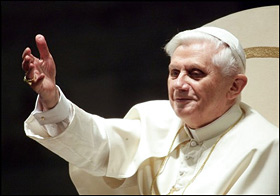 |
 |
 |
 News from Around the Americas | January 2006 News from Around the Americas | January 2006  
Pope Encyclical Mandates Charity
 Nicole Winfield - Associated Press Nicole Winfield - Associated Press


| | Pope Benedict XVI gestures to the faithful gathered for the weekly general audience in Pope Paul VI hall at the Vatican, Wednesday Jan. 25, 2006. (AP) |
Vatican City - Pope Benedict XVI said Wednesday in his first encyclical that the Roman Catholic Church has no desire to govern states or set public policy, but can't remain silent when its charity is needed to ease suffering around the world.

In the long-awaited document "God is Love," Benedict explores the relationship between God's love for mankind and the church's works of charity, saying the two are intrinsically linked and the foundation of the Christian faith.

The 71-page encyclical, eagerly watched for clues about Benedict's major concerns, characterizes his early pontificate as one in which he seeks to return to the basics of Christianity with a relatively uncontroversial meditation on love and the need for greater works of charity in an unjust world.

Even Vatican officials have expressed some surprise at the topic, considering Benedict was the Vatican's chief doctrinal watchdog and could easily have delved into a more problematic issue such as bioethics in his first authoritative text.

In the encyclical, Benedict said the church's work caring for widows, the sick and orphans was as much a part of its mission as celebrating the sacraments and spreading the Gospels. However, he stressed that the church's charity workers must never use their work to proselytize or push a particular political ideology.

"Love is free; it is not practiced as a way of achieving other ends," he wrote.

"Those who practice charity in the church's name will never seek to impose the church's faith upon others. They realize that a pure and generous love is the best witness to the God in whom we believe and by whom we are driven to love."

He rejected the criticism of charity found in Marxist thought, which holds that charity is merely an excuse by the rich to keep the poor in their place when the rich should be working for a more just society.

While the Marxist model, in which the state tries to provide for every social need, did respond to the plight of the poor faster than even the church did during the Industrial Revolution, it was a failed experiment because it couldn't respond to every human need, he wrote.

Even in the most just societies, charity will always be necessary, he said.

"There will always be suffering which cries out for consolation and help. There will always be loneliness. There will always be situations of material need where help in the form of concrete love of neighbor is indispensable," he said.

Benedict stressed that the state alone is responsible for creating that just society, not the church. "As a political task, this cannot be the church's immediate responsibility," he said.

However, he said the church wants to be involved in political life by helping "form consciences in political life and stimulate greater insight into the authentic requirements of justice as well as greater readiness to act accordingly, even when this might involve conflict with situations of personal interest."

He said the church was "duty-bound" to offer such a contribution, and that the lay faithful, who as citizens of the state, are duty-bound to carry it out through works of charity.

While stressing that the church has no direct political role, he did offer a prescription for what the state should do.

"We do not need a state which regulates and controls everything, but a state which, in accordance with the principle of subsidiarity, generously acknowledges and supports initiatives arising from the different social forces and combines spontaneity with closeness to those in need," he wrote. | 
 | |
 |



